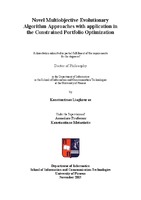Novel multiobjective evolutionary algorithm approaches with applications in the constrained portfolio optimization

Doctoral Thesis
Συγγραφέας
Liagkouras, Konstantinos
Λιάγκουρας, Κωνσταντίνος
Ημερομηνία
2015-11Επιβλέπων
Μεταξιώτης, ΚωνσταντίνοςΠροβολή/
Λέξεις κλειδιά
Multiobjective optimization ; Evolutionary algorithms ; Genetic operators ; Portfolio optimization ; Efficient frontier ; Cardinality constraint ; Encoding schemeΠερίληψη
Multiobjective optimization (MO) is the problem of simultaneously optimizing two or
more conflicting objectives subject to certain constraints. Many real-world problems
involve simultaneous optimization of several often conflicting objectives. The
portfolio optimization problem belongs to this category of problems. According to
Markowitz’s Mean - Variance model (MV) an investor attempts to maximize
portfolio expected return for a given amount of portfolio risk or minimize portfolio
risk for a given level of expected return.
The portfolio optimization problem involves two conflicting objectives (i.e.
expected return and portfolio risk) and thus belongs to the family of multiobjective
problems. With the assistance of scalarization techniques a multiple objective
problem can be converted into a single objective problem. However, the drawbacks to
these conventional approaches lead to the development of alternative techniques that
yield a set of Pareto optimal solutions rather than only a single solution.
The problem becomes much more complicated when we incorporate to the
portfolio model some real world constraints. These additional constraints made the
portfolio optimization problem difficult to be solved with exact methods. In the last
decade several metaheuristic optimization techniques have been developed to address
the challenges imposed by complex multiobjective optimization problems. Due to the
intrinsic multiobjective nature of the portfolio optimization problem, multiobjective
approaches, particularly multiobjective evolutionary algorithms (MOEAs) are suitable
in handling the difficulties imposed by this type of problems.
Especially in the presence of multiple constraints the portfolio optimization
problem becomes very complicate and efficient solution needs to be found.
Furthermore, the existing multiobjective evolutionary algorithms (MOEAs)
techniques cannot be used directly to solve the constrained portfolio optimization
problem as a number of configuration issues related to the application of MOEAs for
solving the constrained portfolio optimization problem must be addressed. The
successful implementation of the constrained portfolio optimization problem by the
MOEAs requires the development of novel algorithmic and technical approaches. In
particular new multiobjective evolutionary approaches are needed to efficiently solve
the constrained portfolio optimization problem. In this thesis we address these issues by examining a number of configuration
issues related to the application of MOEAs for solving the constrained portfolio
optimization problem. Furthermore we introduce a new multiobjective evolutionary
algorithm (MOEA) that incorporates a novel representation scheme and specially
designed genetic operators for the solution of the constrained portfolio optimization
problem. These issues have been addressed in this thesis and a set of efficient
solutions is found for each of the examined test problems.
In this thesis we develop a methodological framework for conducting a
comprehensive literature study based on the papers published in MOEAs for the
Portfolio Management over a long time span across various disciplines. This
framework is being used to gain an understanding of the current state of the MOEAs
for the Portfolio Management research field. Based on the literature study, we identify
potential areas of concern in regard to MOEAs for the Portfolio Management. Based
on the examination of the state-of-the art we present the best practices from a
technical and algorithmic point of view for dealing with the complexities of the
constrained portfolio optimization problem. We introduce new genetic operators to
enhance algorithms’ performance. We propose a novel representation scheme for the
solution of the constrained portfolio optimization problem. Finally, we introduce a
novel MOEA for the solution of the constrained portfolio optimization problem. The
experimental results applied to the constrained portfolio optimization problem,
indicate that the proposed approach generates solutions that lie on the true efficient
frontier (TEF) for all of the examined cases for a fraction of time required by exact
approaches.


